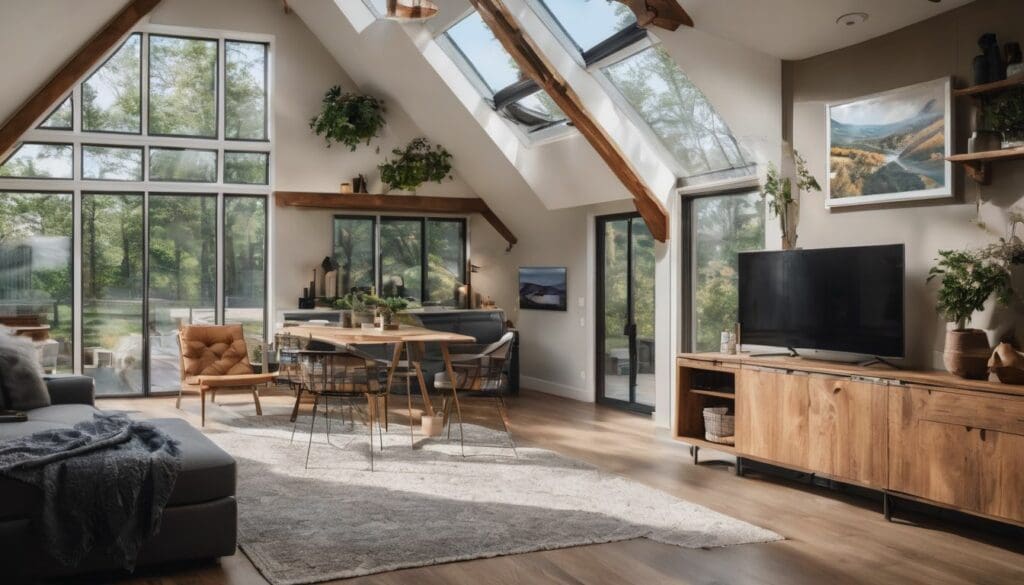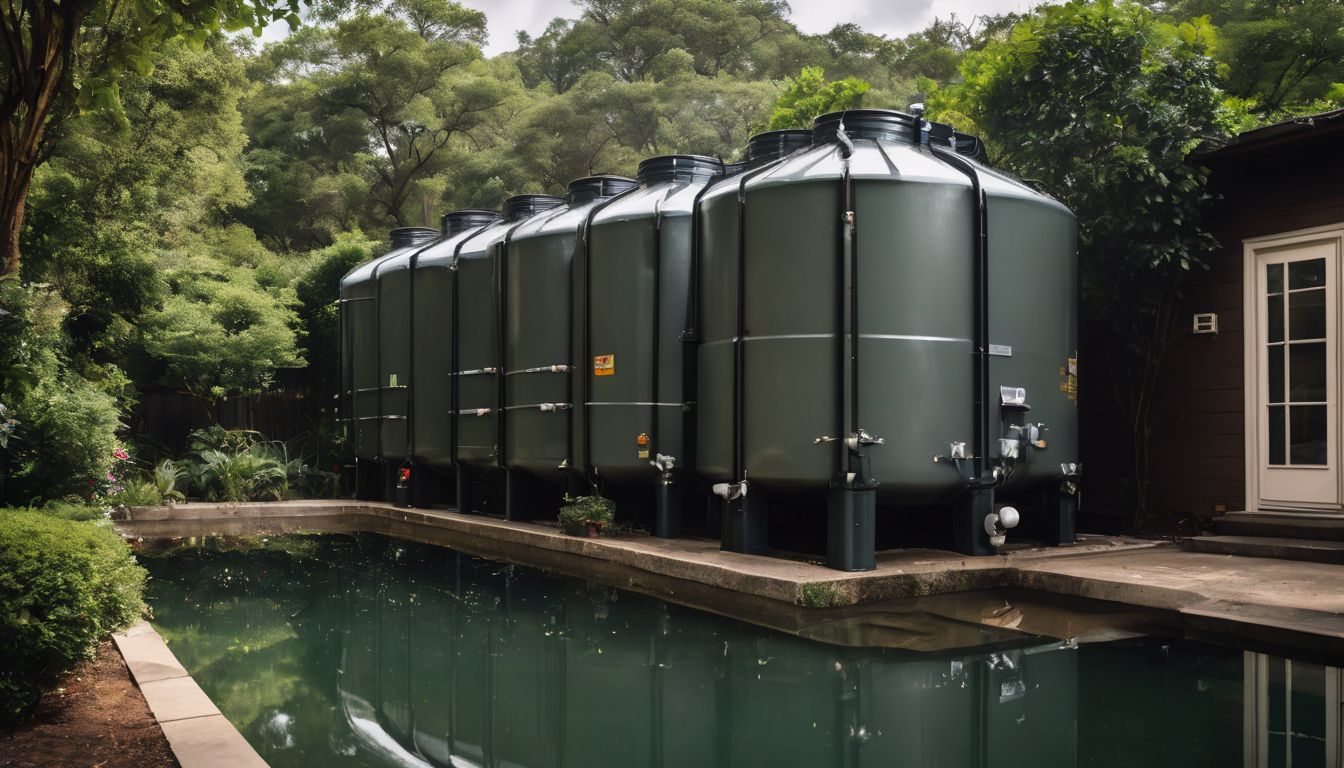Your energy bills are creeping up, and you’re not sure why. A shocking 20% of household expenses go towards heating and cooling on average. This article lays out how energy efficiency workshops can arm you with the knowledge to slash those costs.
Prepare to save money!
Key Takeaways
- Energy efficiency workshops provide homeowners with knowledge and skills to cut down on energy bills by identifying areas of waste in their homes, such as air leaks, inadequate insulation, and inefficient appliances.
- Participants of the workshops learn how to perform DIY home energy assessments using audit checklists and are introduced to professional assessment benefits which offer more detailed evaluations for optimising home sustainability.
- The sessions cater not only to individuals looking to reduce personal energy costs but also those keen on pursuing clean energy careers or advocating for environmental conservation within their communities through practical measures gained during training.
- Additional resources offered include housing counselling for energy efficiency, information about grants for improving residential energy efficiency, and opportunities for employment in the burgeoning clean energy sector.
- Workshops emphasise hands-on experience like sealing leaks or checking insulation levels alongside discussions about renewable energy sources, providing immediate actionable steps that can lead to long-term savings and reduced environmental impact.
What are Energy Efficiency Workshops?
Energy Efficiency Workshops are educational sessions designed to help homeowners understand and implement energy-saving techniques in their homes. The workshops target environmentally conscious individuals who want to reduce their carbon footprint and lower their energy bills.
Purpose of workshops
Energy efficiency workshops aim to empower homeowners with the knowledge and skills needed to reduce their energy consumption. Participants learn how to conduct home energy audits, identify areas where energy is wasted, and find solutions that lead to significant cost savings.
These sessions delve into green building practices, offering guidance on selecting energy-efficient appliances and improving HVAC systems. By mastering these techniques, attendees can boost their homes’ overall sustainability.
The workshops also serve as a platform for discussing residential energy programmes and exploring New York State energy rebates that may be available. They provide hands-on experience in weatherization techniques and insulation improvements, equipping individuals with practical measures to enhance their living spaces’ efficiency.
Through these educational encounters, participants become advocates for conservation within their communities, promoting renewable energy usage and spearheading a shift towards more responsible consumption patterns.
Target audience
Homeowners who are passionate about environmental sustainability and keen on reducing their energy costs will find these workshops immensely beneficial. Those interested in learning practical ways to enhance home energy efficiency, conducting DIY home energy assessments, or seeking professional services for comprehensive home energy audits will gain valuable insights from the workshops.
Individuals looking to explore clean energy career opportunities or those wanting to invest in energy-efficient appliances can also benefit from the training programmes offered.
Environmentally conscious individuals may also be eager to understand housing counselling for energy efficiency, residential grants available for enhancing home energy efficiency, as well as learning about various resources for supporting conservation efforts.
Benefits of attending
By attending Energy Efficiency Workshops, environmentally conscious individuals can gain valuable knowledge and skills to reduce energy costs and minimise their environmental impact. Additionally, participants can benefit from the following:
- Learning practical techniques to conduct a home energy assessment using an audit checklist tailored to residential energy efficiency.
- Acquiring insights into identifying and sealing air leaks around the house to improve energy conservation and comfort.
- Understanding the importance of ventilation in maintaining indoor air quality while conserving energy.
- Gaining knowledge about checking insulation levels to optimise home heating and cooling efficiency.
- Accessing information on professional home energy assessments and the potential benefits of hiring a certified professional for comprehensive evaluations.
- Exploring opportunities for funding, support, and training in clean energy careers, particularly in underserved communities.
Do-It-Yourself Home Energy Assessments
Finding and sealing air leaks, checking insulation levels, and understanding the importance of ventilation are key components of a DIY home energy assessment. These simple tasks can help homeowners save on energy costs and make their homes more comfortable.
How to locate air leaks
Locating air leaks is essential for improving energy efficiency in your home. Here’s how to do it:
- Check around windows and doors for any gaps or cracks that may be letting air in or out.
- Inspect electrical outlets, switch plates, and baseboards for potential air leaks.
- Examine areas where different building materials meet, such as corners and edges of ceilings, walls, and floors.
- Use a smoke pencil or incense stick to find drafts by observing the direction of the smoke movement.
- Consider using a thermal camera to detect temperature differences that indicate air leaks.
How to seal air leaks
After locating air leaks in your home, taking steps to seal them can greatly improve energy efficiency and reduce utility costs. Here are some effective methods for sealing air leaks:
- Caulking: Use caulk to seal gaps or cracks around windows, doors, and other openings to prevent air leakage.
- Weatherstripping: Apply weatherstrips around windows and doors to create a tight seal and prevent draughts.
- Insulation: Fill gaps and spaces with expanding foam insulation to prevent heat loss or gain.
- Door sweeps: Install door sweeps at the bottom of exterior doors to block out draughts and cold air.
- Outlet gaskets: Use outlet gaskets to seal electrical outlets and switches on exterior walls where air can leak through.
- Pipe insulation: Wrap pipe insulation around exposed pipes to stop heat from escaping into unheated areas of your home.
- Window films: Apply window films to help reduce heat transfer through windows without blocking natural light.
- Chimney dampers: Install chimney dampers to minimise heat loss when the fireplace is not in use.
Importance of ventilation
Ventilation is crucial for maintaining good air quality within a home. Proper ventilation helps to remove indoor air pollutants, such as cooking odours and chemicals, while also reducing moisture build-up that can lead to mould growth.
Ensuring adequate ventilation in the home can improve indoor air quality and contribute to a healthier living environment. By understanding the importance of ventilation, homeowners can effectively manage energy use without compromising on air quality.
To maintain healthy living conditions and reduce energy consumption, it’s essential for homeowners to prioritise proper ventilation. This not only supports environmental conservation efforts but also contributes towards creating sustainable homes for future generations.
Checking insulation levels
To check insulation levels, follow these steps:
- Use a ruler or tape measure to determine the thickness of the insulation in your home’s walls, ceilings, and floors.
- Look for any gaps or uneven coverage in the insulation material, which could lead to energy inefficiency.
- Check for signs of deterioration such as discoloration, moisture damage, or pest infestation that may compromise the effectiveness of the insulation.
- Assess if your current insulation meets the recommended R – value for your region to ensure optimal energy efficiency.
- Consider consulting with a professional to conduct a comprehensive assessment and address any issues identified during the inspection.
Professional Home Energy Assessment
A professional home energy assessment provides a comprehensive evaluation of your home’s energy usage, identifying areas for improvement and offering targeted solutions. Hiring a professional can provide more accurate results and tailored recommendations for maximum energy efficiency.
How it differs from DIY assessment
A professional home energy assessment differs significantly from a DIY assessment in terms of expertise and thoroughness. While a homeowner may locate obvious air leaks, a professional can identify hidden ones using specialised equipment such as infrared cameras and blower door tests.
Additionally, professionals have the knowledge to assess insulation levels accurately, ensuring that your home is effectively insulated to conserve energy.
Furthermore, hiring a professional provides homeowners with comprehensive recommendations tailored to their specific needs. These experts can offer advice on efficient appliances, HVAC systems, and renewable energy sources, enabling homeowners to make well-informed decisions for long-term energy savings and environmental benefits.
Benefits of hiring a professional
- Professional expertise ensures accurate identification of energy inefficiencies and tailored solutions to maximise cost savings.
- Access to cutting – edge technologies allows professionals to conduct thorough assessments, identifying hidden issues that homeowners may overlook.
- Professionals provide detailed reports with actionable recommendations, enabling homeowners to make informed decisions for long-term energy efficiency.
- Utilising industry knowledge, professionals can help homeowners access available grants and incentives, maximising their investment in energy-saving improvements.
Housing Counseling Energy Efficiency Essentials Series
The Housing Counseling Energy Efficiency Essentials Series offers training objectives, schedule and materials, as well as additional resources for homeowners interested in improving energy efficiency.
The series provides valuable information and tools to help homeowners make impactful changes in their energy usage.
Training objectives
In our energy efficiency workshops, we aim to equip homeowners with the knowledge and skills needed to assess and improve their home’s energy usage. By the end of the training, participants will be able to conduct a DIY home energy assessment, identify areas for improvement in insulation, ventilation, and air leaks.
Additionally, they will gain an understanding of the benefits of professional home energy assessments and receive information on housing counseling energy efficiency essentials. Our objective is to empower individuals to make informed decisions that contribute towards greater environmental sustainability while reducing their household energy costs.
The training aims to provide practical information that can be applied immediately after completion. It includes hands-on activities and interactive discussions designed to engage participants actively in learning about residential energy efficiency techniques.
Schedule and materials
The schedule for our energy efficiency workshops includes both weekday and weekend sessions to accommodate everyone. Materials provided will include comprehensive handouts, interactive tools, and resources for further learning. Participants will also receive a checklist of energy-saving actions to take home, ensuring practical application of the workshop content. Our workshops are designed to provide hands-on learning experiences and empower homeowners to make informed decisions about their energy usage.
Additional resources
Explore additional resources to further your knowledge and skills in energy efficiency. Look into online residential energy efficiency training courses that provide comprehensive insights into conducting home energy surveys, identifying areas of improvement, and implementing energy-saving solutions.
Investigate energy conservation workshops for homeowners offered by local environmental organisations or community centres to gain practical tips on reducing energy consumption and lowering utility bills.
Consider enrolling in housing counselling programmes for energy efficiency that offer valuable guidance on sustainable living practices, including how to make informed decisions when investing in energy-efficient appliances and home renovations.
Training for Clean Energy Careers
Learn about the opportunities for employment in clean energy careers, including funding and support for underserved communities. Explore training options for current employees to transition into clean energy roles.
Opportunities for employment
Learn about the following opportunities for employment in the energy efficiency sector:
- Green building consultant: You could work with architects and builders to ensure homes are constructed with energy efficiency in mind, reducing their environmental impact.
- Energy auditor: This role involves visiting homes and assessing their energy usage, recommending changes to make them more efficient.
- Renewable energy installer: You could work on installing solar panels, wind turbines, or other renewable energy sources in homes to reduce reliance on traditional energy sources.
- Energy efficiency programme coordinator: Work with local authorities or non-profits to develop and implement programmes that help homeowners improve their energy efficiency.
- HVAC technician specialising in energy-efficient systems: This role involves installing and maintaining heating, ventilation, and air conditioning systems that focus on reducing energy usage.
- Building performance analyst: Use your skills to analyse data on a building’s energy usage and identify areas where improvements can be made.
Funding and support for underserved communities
Underserved communities can access financial assistance and support to pursue energy efficiency initiatives. Grants, subsidies, and rebates are available to help cover the costs of home energy assessments and improvements.
Additionally, special programs provide training for clean energy careers and assist in funding for households that may struggle to invest in energy-efficient appliances or upgrades.
These resources enable more equitable access to energy-saving opportunities, ultimately contributing to a more sustainable future. By leveraging these forms of support, underserved communities can actively participate in reducing their environmental impact while also benefitting from reduced energy bills and enhanced indoor comfort.
Training for current employees.
To further advance energy efficiency initiatives, current employees can participate in specialised training tailored to enhance their skills and knowledge. This training empowers them with the expertise required to implement effective energy-saving measures within the company.
By gaining an understanding of efficient practices, employees can actively contribute to reducing energy consumption and improving sustainability at work. Additionally, they can explore certification courses related to energy efficiency, equipping themselves with the latest industry standards.
Expanding employee knowledge through targeted training sessions not only enhances individual skill sets but also contributes towards overall company performance by fostering a culture of environmental responsibility.
Conclusion
In conclusion, conducting energy efficiency workshops for homeowners is an effective way to empower individuals to reduce their energy consumption. By providing practical tools and knowledge, homeowners can take proactive steps to lower their energy bills and decrease their environmental impact.
These workshops serve as a platform for fostering a culture of sustainable living within communities by equipping participants with the necessary skills and resources. Hosting such events not only benefits attendees but also contributes towards building more environmentally-conscious neighbourhoods where conservation and sustainability are prioritised.
FAQs
1. What will I learn at an energy efficiency workshop for homeowners?
You’ll discover how to save on energy costs with home energy audits, and get tips about making your home more efficient, like using energy-efficient appliances.
2. Are there special sessions for understanding manufacturing energy efficiency?
Yes, workshops can include segments on manufacturing energy efficiency to help you understand how products are made with saving energy in mind.
3. Can renters benefit from these workshops as well?
Absolutely! Energy efficiency counselling is available to teach renters ways to improve the efficiency of their homes even without owning them.
4. Will I receive any certification after attending a workshop on home energy savings?
Participating in a workshop may lead you towards seeking out an official Energy Efficiency Certification Course for comprehensive training and recognition.





